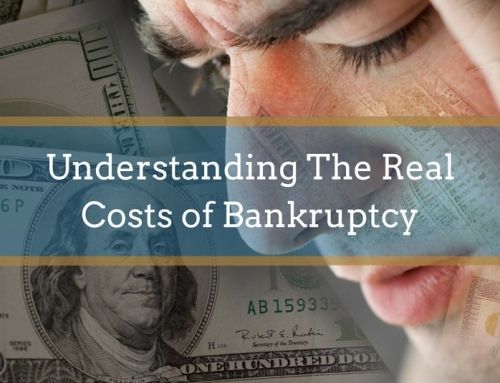Who would think that filing for Chapter 13 bankruptcy would be considered one of those “happy times”? If your marriage falls apart during your case, you could be looking at tougher times ahead.
Lots of married couples who make the decision to file for bankruptcy do so at a time when the marriage is on rocky ground. Bill problems and the associated stresses they cause can tax even the strongest relationship.
Chapter 13 bankruptcy requires budgeting and mindfulness in dealing with your finances. If you’re married, you’re going to have to work together to keep the household in check. It doesn’t matter whether you’re filing together or on your own; a household budget doesn’t change based on who’s filing for bankruptcy.
Still, most of my clients find that going into bankruptcy takes away stress rather than adding to it. Though keeping to a plan isn’t simple, it gives people the chance to work together towards a common goal.
For some, however, the damage to their relationship is far too extensive by the time they come to me. Separation and, ultimately, talk of divorce becomes the order of the day. That’s going to impact your income as well as your expenses.
Your Bankruptcy Lawyer May Have To Go
A lawyer can’t represent someone who has a conflict with another client. If you’re getting divorced, you and your soon-to-be former spouse are in conflict of a very real nature. Your lawyer may need to withdraw, leaving both of you looking for a new attorney.
If the divorce is amicable, however, your bankruptcy lawyer may be able to keep both of you on as clients. You’ll need to sign a few waivers regarding the potential conflict, but that should be fairly simple.
Can Your Plan Be Completed?
If you’re getting divorced, you and your spouse are going to have to decide who’s going to pay into the Plan, and how the money will be divided. If the Chapter 13 covers joint debts, there’s a better chance that both of you will pitch in. If, however, the debts are one-sided then there may be some friction.
Remember that if the Plan can’t be completed due to the divorce, you may be able to modify your Chapter 13 payments due to the change in income and expenses in connection with the divorce.
Regardless, your attorney will need to review with you and your spouse whether the new Plan payments are going to be sufficient to pay back the debts required in Chapter 13.
Beware of Property Divisions
During a Chapter 13 bankruptcy, you’re not allowed to transfer property without court permission. If there’s going to be a property settlement in connection with the divorce, you may need to get permission from the bankruptcy court.
For Nasty Divorce Battles, Split The Chapter 13
If the divorce gets heated, you may not be able to work together in your Chapter 13. You and your spouse will have to hire new bankruptcy lawyers and file a motion with the court to split your case into two distinct Chapter 13 bankruptcy filings (or convert one of the cases to Chapter 7, or dismiss one of them). You and your spouse will each file a new Chapter 13 Plan and things will roll on accordingly.
Here’s The Critical Piece Of The Puzzle
You need to talk with your bankruptcy lawyer if you think you’re going to be splitting up. I can’t say what other lawyers do in this situation, but I view my role as part lawyer, part counselor. If clients are having problems we need to talk so we can figure out a way to handle things properly.





